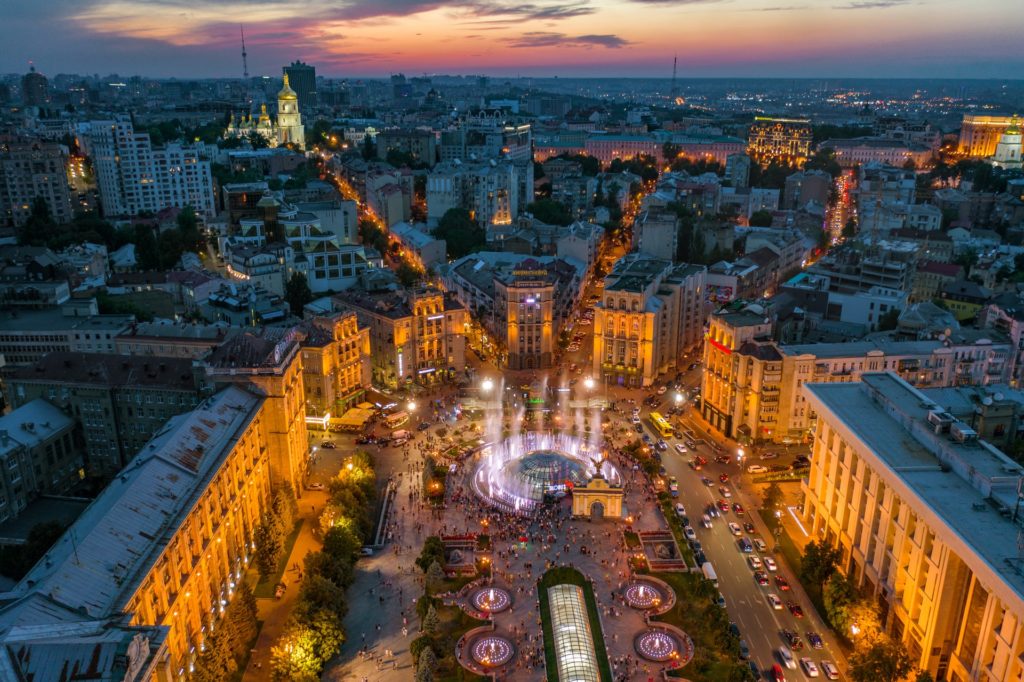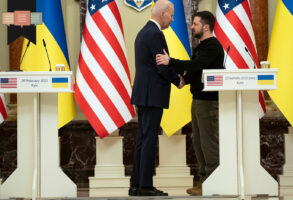
Published February 25, 2022
Following up on yesterday’s exclusive interview, Carl E. Olson of the Catholic World Report corresponded again today with George Weigel, Distinguished Senior Fellow of Washington’s Ethics and Public Policy Center, about the many developments in Ukraine.
CWR: What are some of the most noteworthy developments in Ukraine since we spoke on February 24th?
Weigel: It now seems clear that Vladimir Putin is pursuing a decapitation strategy aimed at replacing the democratically elected Ukrainian government with some sort of puppet regime under his thumb — a regime that would control all or a good part of Ukraine. That Putin himself may be coming further unhinged was suggested by his appeal to Ukrainian soldiers to turn against their own government, which was led by “Nazis and drug addicts.”
It also seems clear that Putin and his military seriously underestimated the will and capacity of both the Ukrainian people and the Ukrainian armed forces, which have been fighting valiantly and with effect, even against overwhelming force. The defiance of Ukrainians defending a small island in the Black Sea before they were annihilated by a Russian naval vessel whose personnel demanded the Ukrainians’ surrender has inspired many Ukrainians, and ought to inspire everyone who cherishes freedom.
If Putin believed his own manic lies about Ukraine not being a real country, and therefore expected the Ukrainians to roll over, he has surely been disabused of that notion. As more than one Ukrainian has said, Putin’s main accomplishment thus far has been to unify Ukraine and Ukrainians as never before. That includes Ukrainians whose primary language is Russian: men and women who know the difference between the imperfect democracy of Ukraine and the pluperfect tyranny of Putin’s Russia, and have no desire to live in a Putin-led kleptocracy with a per capita GDP half that of Lithuania and some of the world’s worst public health problems.
Recruiting stations in Ukrainian cities over the past twenty-four hours have been swamped with volunteers for the territorial defense forces being raised to supplement the regular Ukrainian army; those forces are having some success, especially when Russian troops attack their neighborhoods. Ukrainian friends also tell me that the young Russian soldiers captured by Ukrainian forces seem numbed, dazed, and confused. Evidently they were told by their commanders that they would be participating in training exercises, and then suddenly found themselves on a live-fire battlefield. There have also been significant Russian casualties. Needless to say, none of this is being reported in Russia by the state media, which is churning out the most toxic propaganda and disinformation the world has seen since Dr. Goebbels.
So the picture that has emerged from the fog of war is that of unmotivated and confused young Russian soldiers, supported by air, sea, and armor, contending against highly motivated Ukrainian armed forces, both regulars and the territorial defense forces. At the very least Putin’s hope for a blitzkrieg victory has been thwarted. And it may well be the case that, throughout the West, there has been, in general, a tendency to overestimate Russian power while underestimating Ukrainian will.
As for the sanctions announced yesterday by the United States, Great Britain, and the EU, my Ukrainian friends and colleagues uniformly find them insufficient, however welcome. As I noted in our previous conversation, what would bring serious internal pressure on Mr. Putin to change his present course of action would be immediately cutting Russia and Russians out of the SWIFT network of international financial exchange. I’m told that the countries balking at that are Germany, Italy, Hungary, and Cyprus. Some robust arm-twisting with those countries’ leaders would seem to be in order if the stated Western determination to support Ukrainian sovereignty and independence is going to be taken seriously.
CWR: There are reports that the Russian invasion is going more slowly than anticipated, but it’s also clear that Putin is determined to get to Kyiv. How do you see that going?
Weigel: Russian special forces, I’m told, were pre-positioned in Kyiv, and there is great concern about their carrying out targeted assassinations and attempting to take over the governmental center of the city tonight. The next 24-48 hours will thus be critical in Kyiv. But Kyiv is not the only battleground in Ukraine and the more that pictures of Russian attacks on civilian targets on Kyiv and elsewhere reach the world outside Ukraine, the greater the pressure on Russia to cease and desist will be. Whatever happens in Kyiv over the weekend, however, will not determine the final outcome of this struggle, which will continue.
It is imperative that the West not lose its nerve now. In addition to providing munitions like the Javelin missiles that have proven very effective against Russian armor, the West should go on the moral offensive against Putin, turning him into an international pariah. This is where the West has leverage that Putin cannot blunt.
Some Ukrainian friends have spoken of an international effort to arraign the Russian autocrat for war crimes at the International Criminal Court. There would be a lengthy bill of indictment going back years, and including Putin’s depredations in Russia itself, and in places like Syria, Moldova, and Georgia.
It is also far past time for the United States and other Western countries with detailed intelligence on how Putin has become one of the world’s wealthiest men by stealing billions from his own country to release that data, including pictures of Putin’s luxury properties. Adlai Stevenson dramatically unveiling the photographic evidence of Soviet missile emplacements in Cuba helped turn the tide of world opinion against the USSR during the October 1962 Cuban Missile Crisis; a worldwide campaign to expose Putin’s greed and corruption could have a similar, salutary effect. So the war in the global information space is critical, too, and should be fought vigorously with the weapon of truth.
CWR: You’ve been in contact with various folks in Ukraine? What are you hearing from them?
Weigel: My friends are both sober and resolute. They are living through their worst nightmare, but they are strong and they are determined not to bow to evil. As my friend Myroslav Marynovych, vice-president for mission at the Ukrainian Catholic University and a former “guest” of the Soviet gulag put it, “Evil doesn’t stop itself; it has to be stopped.”
That lesson applies to the West as well as to Myroslav’s fellow-Ukrainians. The notion that Putin will be satisfied with a neutralized and compliant Ukraine is as fatuous as Neville Chamberlain’s fantasy that Hitler would be satisfied with carving the Sudetenland out of Czechoslovakia in 1938. A Putin who has successfully defied the West over Ukraine will be a Putin further emboldened to continue to try to rollback the verdict of history in the Cold War. He wants NATO to return to its pre-1989 configuration, and after breaking Ukraine he would pursue that by various means.
CWR: How has the Ukrainian Greek Catholic Church been affected so far?
Weigel: The Church’s bishops decided as a group to remain in place to serve their people and to provide humanitarian assistance to refugees. UGCC priests have been heroic in ministering to congregations under attack, and while many have families to care for and perhaps move to safety, the priests themselves are staying in place. The Ukrainian Catholic University in Lviv is hosting refugees, even as it continues its educational work and mounted a very impressive international consultation on the situation by Zoom today. What the Church in Ukraine and in the countries bordering Ukraine need now is help from western Catholics in providing supplies to aid refugees.
I think the UGCC’s leaders were grateful that the leaders of the two Orthodox Church jurisdictions in Ukraine, including the community closely affiliated with the Russian Orthodox patriarchate of Moscow, have both publicly condemned the Russian aggression. Everyone, of course, waits for a similar word of condemnation from the Moscow patriarchate, but without any serious expectation that it will come. My own view is that the Vatican should make clear to the Russian Orthodox leadership that all ecumenical contacts between the Holy See and the Moscow patriarchate are suspended until the latter demonstrates, by condemning Putin’s aggression, that it is not an instrument of Russian state power.
Pope Francis’s visit to the Russian embassy in Rome today, when he spoke by phone with Mr. Putin and asked him to stop the killing, was of course appreciated by Ukrainian Greek Catholics — especially given the Pope’s ill health, which led him to cancel all public engagements for the next week at least. What I have not seen reported yet is that Putin refused to have a phone conversation in which the Pope would participate from the Vatican, insisting that any such conversation be conducted from the Russian embassy. That tells you many things, not least about Putin’s character and his mania for secure communications.
CWR: What do you anticipate for the next few days?
Weigel: A lot of fighting, to be sure, and, I hope, an even more stringent sanctions regime being imposed by the West. What is at stake here is nothing less than the future security of all of Europe. The time to stop Putin, who has made his aims clear for decades, is now. And that means stopping not only his military aggression, but what one Ukrainian friend described as “Russia’s main export, which is not oil and gas but corruption.”
The West has to face its own vulnerability to Putin’s thuggery, which it has facilitated by its own unwillingness to face Putin’s financial corruption and that of his cronies, and the effects of that corruption on internal Western decision-making. Mr. Putin counted on Ukraine rolling over; brave Ukrainians have demonstrated that that’s not going to happen. If Putin has made a similar miscalculation regarding Western resolve, he should be disabused of that, too. If he isn’t, the future is going to be very unpleasant for the entire West.
Carl E. Olson is editor of Catholic World Report and Ignatius Insight.
George Weigel, Distinguished Senior Fellow of the Ethics and Public Policy Center, is a Catholic theologian and one of America’s leading public intellectuals. He holds EPPC’s William E. Simon Chair in Catholic Studies.
George Weigel, Distinguished Senior Fellow of the Ethics and Public Policy Center, is a Catholic theologian and one of America’s leading public intellectuals. He holds EPPC’s William E. Simon Chair in Catholic Studies.











